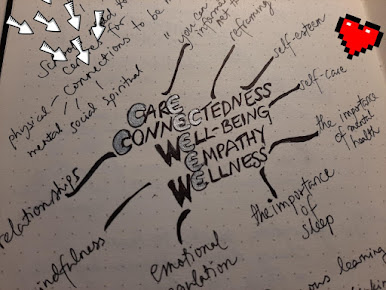Image by Susanna Kohonen
"The body sometimes knows better than the brain", declares a headline in the Finnish Helsingin Sanomat. Research on the hidden interaction between body and brain is on the increase, HS reports.
Body memory or body-based memory, visceral consciousness, subjectivity and self-awareness in the form of sensory awareness - these would have been called nonsense and laughed at just a little while ago.
Humanity, compassion, empathy - are these concepts that are still not fashionable enough to use? "Too soft"? Let's keep in mind that a while ago, also the concepts of emotional intelligence, highly sensitive persons, as well as visceral sensory neuroscience, and even sustainable development, were considered humbug.
In the same way, some still laugh at and consider it humbug to include Drama Education and the subject of Drama in the Finnish national core curriculum for basic education. Drama is not just drama, as we drama people still have to argue in Finland: It's an entire worldview and learning philosophy. It's about critical thinking, empathy skills, social skills, problem solving skills, and putting compassion into practice. In one word, it's embodied learning.
Body and its signals regarding our physiological being are very likely to be even more meaningful than information from outside the body in how we experience self, explains Tiina Parviainen, director of the Jyväskylä Centre for Interdisciplinary Brain Research, in the HS report.
Neuroscientist Antonio Damasio argues that "consciousness is a global, organismic property, not a local brain property". He also argues that the signals transmitted by the body are a central part of self-awareness. Moreover, neuroscientist Catherine Tallon-Baudry proposes that "the neural monitoring of visceral inputs, rather than attention, accounts for first-person perspective in conscious vision".
In other words, the body directly, without signals "going to the brain first", participates in how we experience awareness, consciousness, and what we call mental activity.
Long live embodied and experiential learning that incorporate the entire person in the learning process!
As a teacher, I've often had to take on the role of an agitator when introducing experiential and embodied activities for adult learners: "We are not seated here just as brains; I see perfectly whole, embodied persons before me".
A human being is a beautifully holistic entity. But when did you last experience learning and teaching taking that holistic view into account?
Learning is, as is a human being, taking place in a body; embodied. Learning is intensified when it takes places within interaction, as is our being. In its most holistic form, the learning process activates also bodily awareness as self-awareness.
The holistic understanding of what a human being is, to a large extent, still remains a mystery to the Western medicine and worldview. A little bit like the understanding of the universe and the earth started changing through the efforts of Galileo Galilei and Tycho Brahe since the late 16th century, we may be on the threshold of enlarging our understanding of human consciousness, and with it, our understanding of what it means to learn, too.
I hope that the covid19-induced lockdown and the current discussions on the new normal will take us back to something we seem to have forgotten: The worldview in which a human being is understood as an entity.
As we orientate toward a new normal, it seems that a more holistic view is starting to shine through. For example, the Faculty of Medicine at the University of Queensland, with their School of Psychology research group Compassionate Mind, recently organised a panel webinar series Compassion and the New Normal.
Furthermore, Anne-Marie Scott, deputy provost of Athabasca University, takes the stance that the new normal should include care and compassion within higher education, too. She promotes care as a sustainability practice.
I truly hope this will be part of the new normal!


Comments
Post a Comment